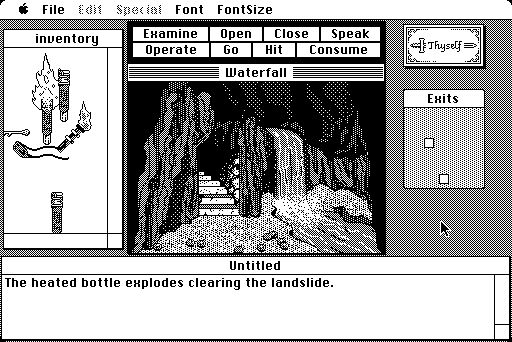I believe most of the ideas discussed here can fall into one of three categories: (1.) user interface design, (2.) parser engine functionality and (3.) best practices. Some might be best served by a combination of those points even.
I’ll use my idea for my dislike of multiple command errors being displayed in the story text. (“You see no such thing, You see no such thing, You see no such thing, etc.”)
1.) When it comes to user interface design, I imagine a Twine-like browser experience where a template can be made in HTML/CSS with specific areas tagged for parser output. So you could have a parser game of unlimited presentation possibilities. For example, just above the command input (which is also positioned by the template), a hidden area could be programmed to hold only error messages. It’s always at the bottom of the scrolling story (via CSS), but every time it’s written to, it’s content is replaced (only the last error is displayed) until a valid command is accepted; upon which the error area is cleared and doesn’t take up space.
2.) The parser engine’s output should be able to target any specific area in the template. Commands that are accepted go to the story output; errors go to the error output (or the story, if you want). You might even have a table of RPG stats on the side where you’re not redrawing the whole table each time, but just outputting specific statistical values to areas within the table. The classic “header bar” takes on a whole new life and isn’t constrained to the top anymore either.
3.) Then again, the other two points can be made less important by providing more interesting errors that don’t feel like an error. If you can’t go in a specific direction, perhaps make fun of it and tell the player, try as they might, the wall does not open; nor will it ever. You can even have a random error message from a pool of “you can’t go there” messages so it’s always a little more interesting. Or you can output the error as normal, but with a different colour/font so that it feels more like a subtle comment, rather than a bold result. (Generic errors should not feel like story prose, in my opinion.)
I really do appreciate you bringing my attention to this topic again, Pinkunz. I think it might be useful when it comes to programmers wanting to build their own parser engine or for those who wish to push the limits of current engines.
Another thing that can be talked about (unrelated to this post though) is the way authors can build text adventures. I recently played with ifSpace and really liked just filling in form fields to construct a text adventure. I found it kind of liberating to not hunt down a misplaced semicolon syntax error. Are there any other examples of text adventure authoring engines that don’t require coding?
Edit: Also, are there any JavaScript parser APIs that could be integrated into a Twine story? I think I remember Manon mentioning that she built a parser game in SugarCube. I’m not sure how that was accomplished though.
